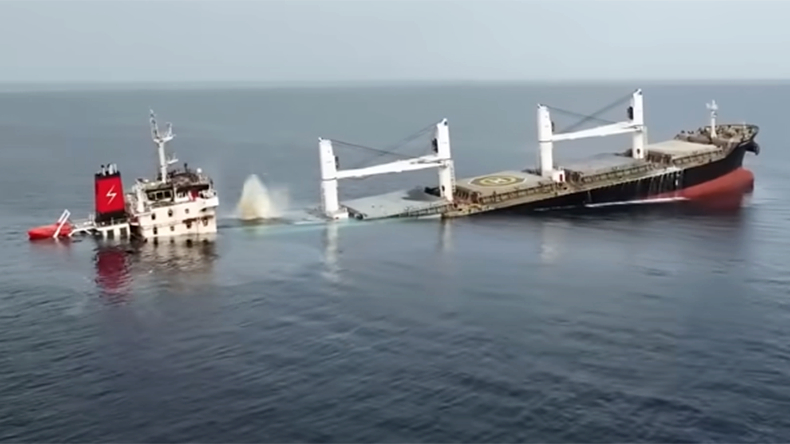Search Ends for Missing Crew After Houthi Rebel Attacks Sink Two Ships in Red Sea: Oil Slicks Raise Environmental Alarms
July 15, 2025

The search for missing crew members from the bulk carrier Eternity C, which was sunk by Yemen’s Houthi rebels in the Red Sea last week, has officially ended, private security firms Ambrey and Diaplous Group announced on Monday. At least four individuals are now presumed dead, while 11 others remain unaccounted for in what has become one of the deadliest maritime attacks in the region this year.
The Eternity C, a Liberian-flagged, Greek-owned vessel, came under intense attack on July 7 by Houthi forces using small arms and bomb-laden drones. Despite carrying a three-man security team, the ship had not requested naval escort from U.S. or European Union forces patrolling the area. The incident followed the sinking of another vessel, the Magic Seas, just a day earlier under similar circumstances. Both attacks are part of an escalating campaign by the Iran-backed Houthi rebels targeting international shipping in response to the ongoing Israel-Hamas conflict in Gaza.
Ten crew members were rescued from the Eternity C, including eight Filipino nationals and one Greek and one Indian from the vessel’s security detail, according to the EU’s naval mission, Operation Aspides. However, four crew members are now presumed dead, and the fate of 11 others remains unknown. The Houthis had earlier claimed to have captured some of the crew, though no proof has been presented. The U.S. Embassy in Yemen suspects some may have been kidnapped.
“The decision to end the search has been taken by the vessel’s owner reluctantly,” the security firms said in a joint statement. “But it believes that, in all the circumstances, the priority must now be to get the 10 souls safely recovered alive ashore and to provide them with the urgent medical support they need at this difficult time. The thoughts of all those involved in the rescue operation are with the families of those who remain missing.”
The attacks have added further strain to global shipping lanes already under pressure due to regional instability. The Red Sea is a vital commercial artery, with nearly $1 trillion in goods passing through each year. The recent spike in attacks has forced some shipping companies to reroute, increasing costs and delivery times.
Beyond the human toll, the sinkings have sparked serious environmental concerns. Satellite images analyzed by the Associated Press using data from Planet Labs PBC show extensive oil slicks emanating from both wreck sites in the southern Red Sea. The slick from the Eternity C extends approximately 80 kilometers, while that from the Magic Seas measures around 65 kilometers, according to Wim Zwijnenburg, an analyst with Dutch peace group PAX.
“The oil slicks threaten fragile marine ecosystems and nearby wildlife reserves, especially in coastal Eritrea,” Zwijnenburg warned. “This region is home to vibrant coral reefs and marine species that could suffer long-term consequences from even limited exposure to leaked bunker fuel.”
The leaked oil primarily comes from the vessels’ propulsion fuel tanks. While such slicks can evaporate over time, experts caution that their presence still poses risks to marine biodiversity, fishing communities, and tourism, especially in a region prized for its underwater life.
As investigations continue and diplomatic efforts attempt to curb the Houthi attacks, maritime industry leaders are calling for increased security measures and coordinated international responses to protect shipping in the Red Sea. Meanwhile, families of the missing crew continue to await news, clinging to hope as the global shipping community reckons with yet another tragedy in an increasingly volatile corridor.
Author: shipping inbox
shipping and maritime related web portal









